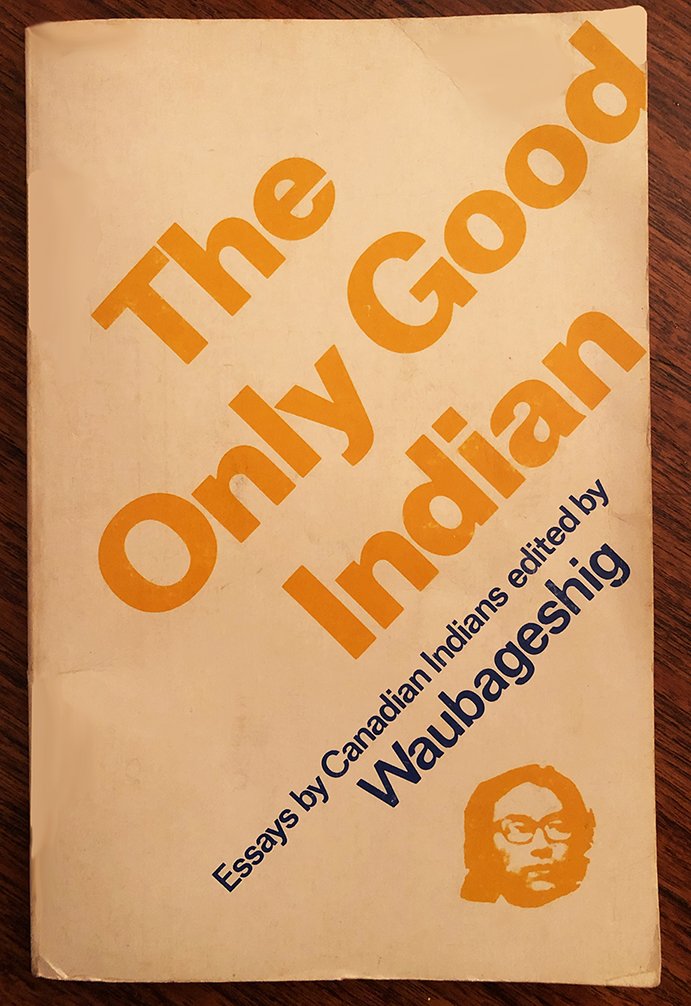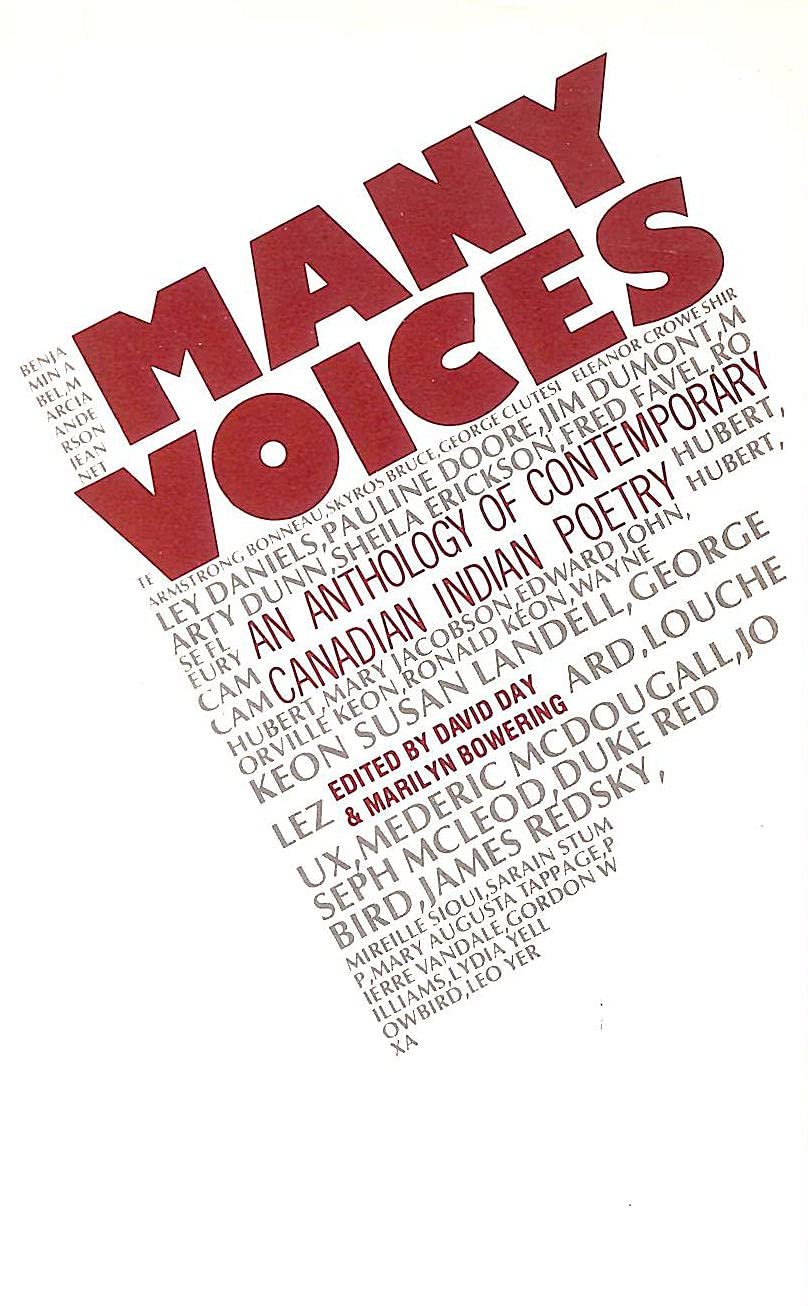
1970, Charley Squash appears in Montreal Gazette

1970 Duke's poem Little Leaf in Vancouver Sun
In this review of the important book: The Only Good Indian, Jack Richards claims that “the finest thing in the book is the poetry of Duke Redbird”, which bookend every other entry by other contributing members.


1971, Cover of Red on White, by Marty Dunn
Red on White is a biography of Duke’s life written by Marty Dunn, and published in 1971.

1971, Review of Marty Dunn's Red on White
A review on Marty Dunn's biography of Duke's life Red on White.

1971, Little Leaf by Duke Redbird

1972, Duke and Frank Meawasige



1973, review of Duke's film To Walk With Dignity

1973, Duke featured in MacLean's (pg1 of 4)
In this featured article from MacLean’s Magazine published in May 1973, Duke first introduces several of his key messaging that he continues to offer today: the Indigenous idea of and/both rather than the white English mentality of either/or; Indigenous life insurance; and the argument that civilized societies existed on Turtle Island long before the arrival of Europeans without the need for “civilized essentials” such as land ownership, competition for personal gain, armies, legislated law, judges, police forces, political parties, money or a written language.

1973, Duke featured in MacLean's Magazine (2 of 4)
Continued from page 1.
After a thorough description of his To Walk With Dignity film produced the year before, this featured article from MacLean’s Magazine we can read Duke’s initial introduction to several of his key messaging that he continues to offer today: the Indigenous idea of and/both rather than the white English mentality of either/or; Indigenous life insurance; and the argument that civilized societies existed on Turtle Island long before the arrival of Europeans without the need for “civilized essentials” such as land ownership, competition for personal gain, armies, legislated law, judges, police forces, political parties, money or a written language.

1973, Duke featured in MacLean's (3 of 4)
Continued from page 2
After a thorough description of his To Walk With Dignity film produced the year before, this featured article from MacLean’s Magazine we can read Duke’s initial introduction to several of his key messaging that he continues to offer today: the Indigenous idea of and/both rather than the white English mentality of either/or; Indigenous life insurance; and the argument that civilized societies existed on Turtle Island long before the arrival of Europeans without the need for “civilized essentials” such as land ownership, competition for personal gain, armies, legislated law, judges, police forces, political parties, money or a written language.

1973, Duke featured in Maclean's (4 of 4)
Continued from page 3
After a thorough description of his To Walk With Dignity film produced the year before, this featured article from MacLean’s Magazine we can read Duke’s initial introduction to several of his key messaging that he continues to offer today: the Indigenous idea of and/both rather than the white English mentality of either/or; Indigenous life insurance; and the argument that civilized societies existed on Turtle Island long before the arrival of Europeans without the need for “civilized essentials” such as land ownership, competition for personal gain, armies, legislated law, judges, police forces, political parties, money or a written language.

1973, Duke at the Mariposa Folk Festival

1973, Mariposa Folk Festival Lineup

1973, Indian Women's Rights Conference poster, Duke listed as M.C.

1974, Duke's Play, The Godfeather, is adapted for Radio

1974, Duke's poetry is published in The Only Good Indian

1975, Cover of Native Council of Canada April Booklet
The Forgotten people-- by Native Council of Canada( Book )
6 editions published between 1972 and 1981
The Native Council of Canada, organized by the Metis and Non-Status Indians to serve them at the Federal level by working with the Federal government agencies and departments, parliamentarians, the National Indian Brotherhood, Inuit Tapirisat of Canada, and other organizations, was working to achieve the goal for the Metis and Non-Status Indians of full native participation in the mainstream of Canada's social, cultural, and economic life. Duke served as Vice-President of the Native Council of Canada in 1974 to 1976 and President of the Metis and Non-Status Indian Association from 1980 to 1983.

1975, Inside the Native Council of Canada April Booklet

1975, The Forgotten People - Metis

1976, Native Country Review


1976, Aboriginal Rights Campaign

1976, Portrait of Duke

1976, Plenty of Real Indians

1976 Native Country and Friends Advertisement

1976, Pow Wow Power - Friends in Concert

1976, Native Country & Friends Tribune

1976, Duke & Winston Wutunee Native Country and Friends Promotional

1976, Native Country and Friends Review

1976, Duke at Native Country

1976, Peace Tower Native Country Performance

1976, Shingoose and Duke Record Label (1 of 2)

1976, Tomahawk in the Wallet (1 of 2)
Article outlines the Metis and non-status Indian struggle with the Trudeau government in 1973. “During the past four years, the 750,000 non-status Indians and Metis have organized themselves into over 600 locals across Canada, headed up by their own elected lobby in Ottawa - the Native Council of Canada. That makes the NCC one of the biggest pressure groups in the country. “
Note the incredible quote by Chief Dan George in the bottom right of page two.

1976, Shingoose and Duke Record Label (2 of 2)

1976, Tomahawk in the Wallet (2 of 2)
Continued from page 1, this article outlines the Metis and non-status Indian struggle with the Trudeau government in 1973. “During the past four years, the 750,000 non-status Indians and Metis have organized themselves into over 600 locals across Canada, headed up by their own elected lobby in Ottawa - the Native Council of Canada. That makes the NCC one of the biggest pressure groups in the country. “
Note the incredible quote by Chief Dan George in the bottom right of page 2.

1977, Duke Performs at The Queen's Silver Jubilee

1977, Duke reciting poetry at the Queen's Silver Jubilee

1977 Duke's poem opens the Queen's Silver Jubilee
For the Queen’s Silver Jubilee in 1977, a multi-media musical-theatrical performance was created based on Duke’s Poetry. The show opened with Duke reciting I Am Canadian.

1977 Queen's Jubilee Duke's Review

1977, The Ottawa Citizen Red Man Did It First


1977, Duke's poetry Published in Many Voices
“When I’m asked why I began to look for poems to include in Many Voices I tend to say it was because Robin Skelton, then my teacher, asked me to think of an important book that was absent from our literature and then do something about it. Although that is true, and it seemed obvious to me during this period of resurgence of First Nations arts (in the early 1970’s) that there must be more Native Canadian poetry being written than was being published, I think, more simply, it was because when I looked at Canadian Literature the gap where this work should be was painful. I’d spent my childhood on Vancouver Island and had been privileged to watch Chief Mungo Martin carving in Thunderbird park; and I was part of a social experiment (as I learned much later from the historian Patrick Dunae) that explains why in an era of Church-run residential schools for most Native Canadians, there were First Nations students in my elementary school classroom. I remember these students well— and was impressed by their accounts of the real work they did with and for their families and of their lives which were so different from mine.”
-Marilyn Bowering
www.marilynbowering.com

1978, Red Power's Duke is an MA

1978, Toronto Native Times Interview (1 of 4)

1978, Toronto Native Times Interview (2 of 4)

1978, Toronto Native Times Interview (3 of 4)

1978, Toronto Native Times Interview (4 of 4)

1978, Duke Redbird, M.A., Vice-President of the Native Council of Canada

1978, Duke at Mariposa Folk Festival

1979, Duke, President of the Ontario Metis and Non-Status Indian Association

1979, The Dance by Duke Redbird

1978, Duke Portrait


























































